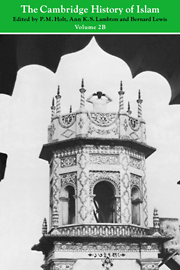Book contents
- Frontmatter
- Introduction
- PART VIII ISLAMIC SOCIETY AND CIVILIZATION
- 1 THE GEOGRAPHICAL SETTING
- 2 THE SOURCES OF ISLAMIC CIVILIZATION
- 3 ECONOMY, SOCIETY, INSTITUTIONS
- 4 LAW AND JUSTICE
- 5 RELIGION AND CULTURE
- 6 MYSTICISM
- 7 REVIVAL AND REFORM IN ISLAM
- 8 LITERATURE
- 9 ART AND ARCHITECTURE
- 10 SCIENCE
- 11 PHILOSOPHY
- 12 WARFARE
- 13 THE TRANSMISSION OF LEARNING AND LITERARY INFLUENCES TO WESTERN EUROPEo
- Dynastic List
- Bibliography
- Glossary
- Index
- References
10 - SCIENCE
from PART VIII - ISLAMIC SOCIETY AND CIVILIZATION
Published online by Cambridge University Press: 28 March 2008
- Frontmatter
- Introduction
- PART VIII ISLAMIC SOCIETY AND CIVILIZATION
- 1 THE GEOGRAPHICAL SETTING
- 2 THE SOURCES OF ISLAMIC CIVILIZATION
- 3 ECONOMY, SOCIETY, INSTITUTIONS
- 4 LAW AND JUSTICE
- 5 RELIGION AND CULTURE
- 6 MYSTICISM
- 7 REVIVAL AND REFORM IN ISLAM
- 8 LITERATURE
- 9 ART AND ARCHITECTURE
- 10 SCIENCE
- 11 PHILOSOPHY
- 12 WARFARE
- 13 THE TRANSMISSION OF LEARNING AND LITERARY INFLUENCES TO WESTERN EUROPEo
- Dynastic List
- Bibliography
- Glossary
- Index
- References
Summary
‘Say, shall those who have knowledge and those who have it not be deemed equal?’ (Qur’ān 39.12). ‘Seek knowledge, in China if necessary.’ ‘The search after knowledge is obligatory for every Muslim.’ ‘The ink of the scholars is worth more than the blood of the martyrs’. It would be possible to quote many such texts from the Qur’ān and many from the Tradition (Hadīth) in which knowledge is extolled, in terse phrases, in the sight of the faithful.
Actually, the knowledge here envisaged is preeminently religious knowledge, which enables man to have a better understanding of the Book of God and the teaching of His Prophet. And it may be maintained, without paradox, that, with the possible exception of its poetry and its proverbs, all Muslim intellectual activity in the widest sense had its starting-point in the Qur’ān: grammar was created by non-Arabs so that they might be able to read the sacred text correctly, rhetoric for the emphasizing of its beauties, the Tradition assembled in order to explain it and supply its omissions, jurisprudence drawn up as a system of principles for moral and social life, and finally theology to defend against sceptics, or even to demonstrate, the truths taught by the Book.
It would have been surprising if this taste for knowledge had not been extended to the ‘profane sciences’ when the Muslims came into contact with those peoples who had inherited them. Even if there were, here and there and at certain periods, theologians of a narrow and defensive orthodoxy who forbade them, it must be said that Muslims in general, led by their caliphs and princes, showed a great thirst for instruction and were eager to assimilate the treasures of ancient science when it came within their reach.
Keywords
- Type
- Chapter
- Information
- The Cambridge History of Islam , pp. 741 - 779Publisher: Cambridge University PressPrint publication year: 1977
References
- 1
- Cited by

